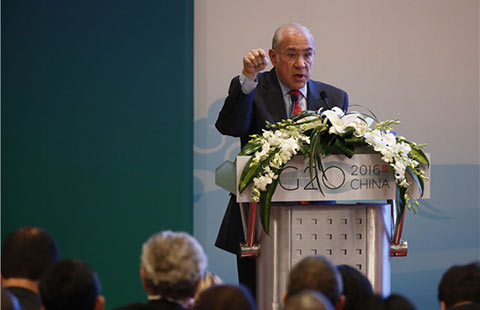China should not be blamed for world economic slowdown
(Xinhua) Updated: 2016-03-01 11:34As a matter of fact, the Chinese economy is in no way as pathetic as some described.
Last year, consumption contributed up to 66.4 percent to the country's GDP growth, setting a new record since 2001. The tertiary sector accounted for 50.5 percent of China's GDP, 10 percent higher than that of the manufacturing industry.
Against the backdrop of a 0.4 percent decrease in its growth rate, China managed to create 11 million jobs in 2015, 300,000 more than the previous year.
Driven by the ongoing supply-side structural reform, China has witnessed the upgrading of its economic structure despite the slowdown, as well as the rise of new industries along with the vanishing of old, outdated industries, which led to the expansion of job creation.
The purported signs of crash of the Chinese economy by some in a rush are, in effect, a strong proof of the economic transformation China has been pushing ahead with, according to John Edwards, a fellow of the Sydney-based Lowy Institute for International Policy.
For global investors, China abounds with opportunities in the near future.
In 2015, venture capitalists invested a record $37 billion in China, more than doubled the previous year's tally, according to data from British consultancy Preqin Ltd..
The company held that China, with more focus on innovation and improving quality, has been emerging as a legitimate challenger to the United States for leadership of the technology industry.
One basic fact that should be acknowledged is that China will by no means encounter overwhelming economic crisis nor recession, thanks to its huge economic aggregate, current market opening and social reform, people's lasting passion for innovation, as well as highly effective government controls.
Just as Chinese Premier Li Keqiang has put it, the Chinese economy has been growing amid challenges.
It is advisable that some countries stop pointing fingers at China and abandon the notorious zero-sum mindset.
It is wise for them to turn to focus on working with China, through global platforms such as the Group of 20, to enhance production capacity cooperation worldwide and inject greater impetus into the sluggish global economy.
- Global asset price turbulence brings challenges, opportunities to China
- Chinese ambassador refutes claims against China amid global market fluctuation
- Economic fundamentals of BRICS unchanged: Chinese official
- Global stock swings not caused by China factors: analysts
- Fed keeps interest rates steady, closely watching global markets
- Russian tourists rushing back to China
- LA sees influx of Chinese visitors
- Company threads its way to Middle East
- Jumei investors demand higher share buyback price
- Apple supplier Manz to sell 29.9% stake to Shanghai Electric
- Alibaba's Internet lender extends $6.88b in loans in 8 months
- Air China seals $2.9b deal with Airbus Group
- China's manufacturing, service activities both contract
















